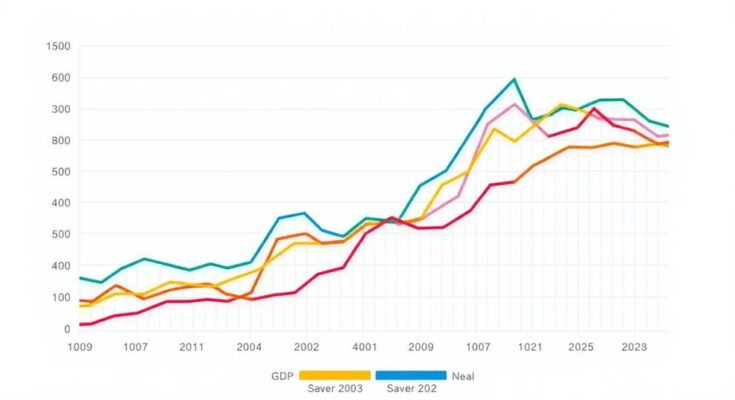The OECD projects a 5.7% GDP growth for Argentina in 2025, signaling recovery after contraction, despite a 28.4% inflation forecast. Economic reforms, sector growth, and a successful debt repayment contribute positively, while challenges such as the need for currency stabilization and fiscal responsibility remain critical.
The OECD projects a GDP growth rate of 5.7% for Argentina in 2025, reflecting a significant improvement in the economic outlook following a period of contraction. Conversely, inflation is anticipated to remain high at 28.4%. These findings are part of the OECD’s March 2025 Interim Economic Outlook report. In parallel, the IMF and World Bank forecast approximately 5% GDP growth for the same period.
Argentina’s Central Bank reports through its Market Expectations Survey that expert forecasts indicate a 23.3% inflation rate coupled with a 4.8% GDP growth in 2025. Key drivers of Argentina’s projected recovery include economic reforms initiated by President Javier Milei’s administration, which began in December 2023. Measures such as a substantial reduction in inflation, anticipated to drop from 117.8% in 2024 to 23.3% in 2025, are central to this positive trend.
Growth in vital sectors, including energy, mining, and agriculture, has been crucial to recovery. An increase in real wages, attributed to disinflation, has enhanced consumer spending. Furthermore, the tax amnesty program initiated in August 2024 has successfully yielded more than $22 billion in new financial inflows, thus bolstering economic recovery efforts.
Despite the optimistic projections, Argentina’s economy is still navigating significant challenges following a predicted contraction of 2.8% in 2024. Stabilization of the national currency remains critical, with financial experts forecasting a nominal exchange rate of 1,175 pesos per dollar by December 2025. The government must continue its commitment to fiscal discipline and ongoing reforms to ensure continued growth and attract foreign direct investments.
Additionally, the Incentive Regime for Large Investments (RIGI), introduced in July 2024, aims to draw substantial investments exceeding $200 million across key sectors, through tax and regulatory benefits. In a further positive development, Argentina successfully repaid $4.341 billion to international bondholders in January 2025, a move that marks a vital step toward rebuilding investor trust under President Milei’s leadership.
In conclusion, the OECD’s projected GDP growth of 5.7% for Argentina in 2025 signals a promising economic recovery, spurred by substantial reforms and sectoral growth. Nevertheless, the high inflation rate poses a significant challenge. Continued fiscal responsibility and targeted economic policies will be essential for sustaining recovery and attracting foreign investments while ensuring financial stability.
Original Source: eurasiabusinessnews.com




